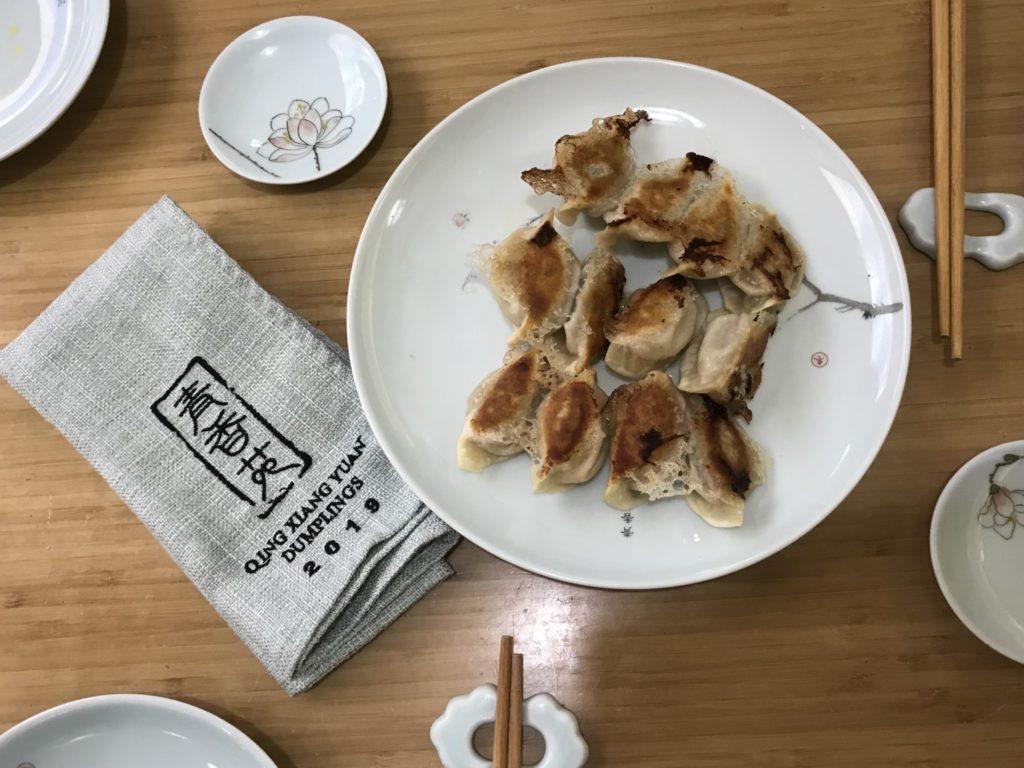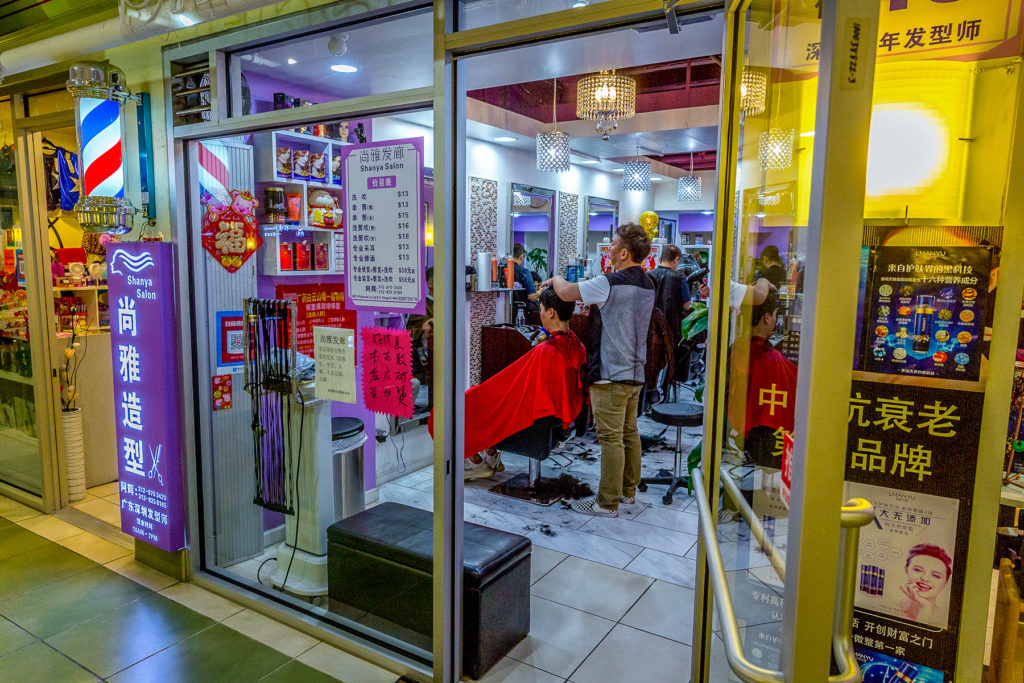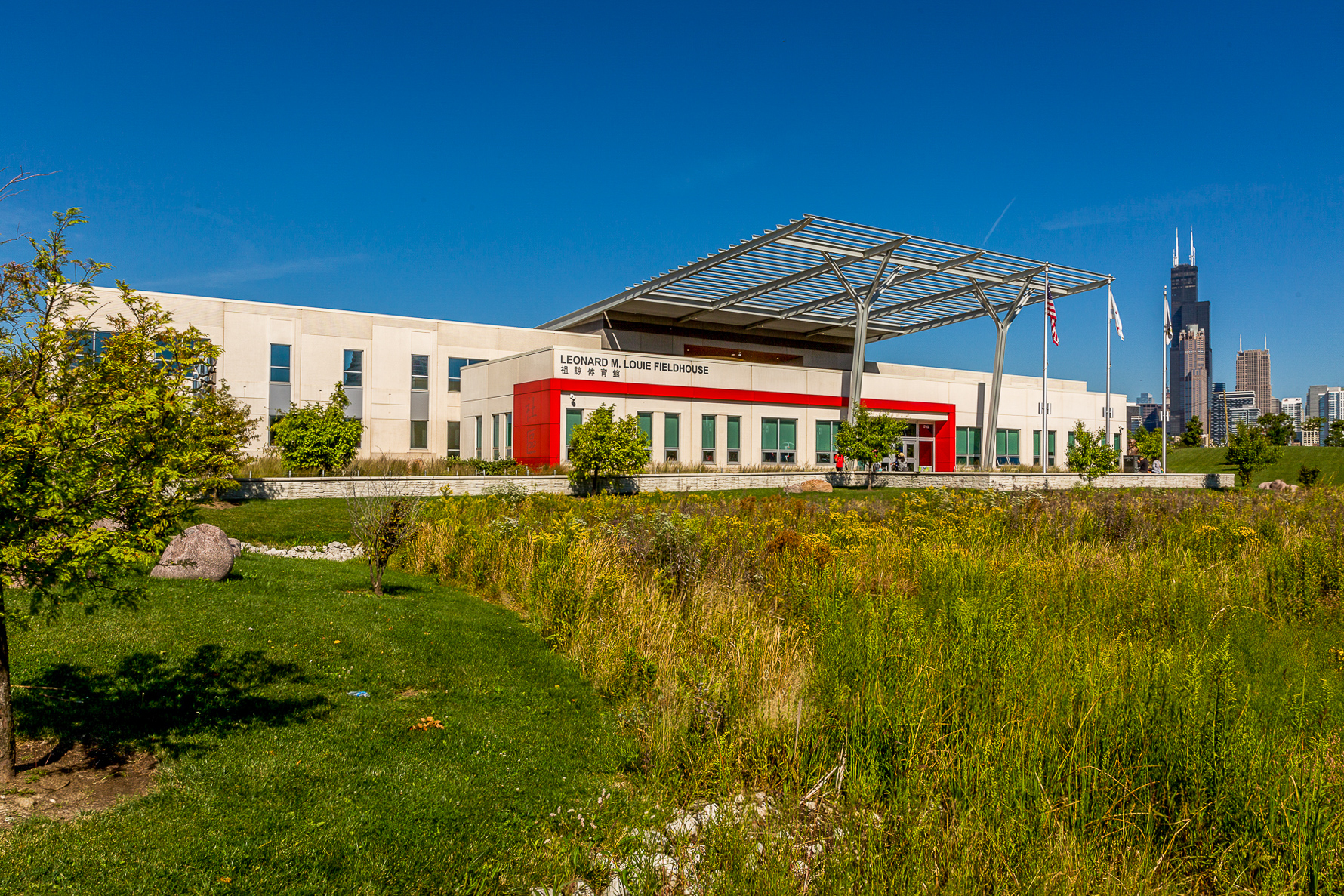- Best Fieldhouse: Leonard M. Louie Fieldhouse
- Best Vegetarian Mapo Tofu on the Cheap: Shu Tin Xia
- Best Way to Commute to Work in Luxury: Water Taxi
- Best Mostly Dumplings: Qing Xiang Yuan
- Best Haircut in a Subterranean Food Court: Shanya Salon
Monica Chia-Chien Chen is the owner of World Journal Bookstore and was a local reporter for the Chinese-language World Journal newspaper for sixteen years.
This bookstore is over thirty years old, and used to be downstairs—actually very big one, actually have more space. And the business was very good. Every Monday restaurants were closed, so the restaurant employees will come to the bookstore to buy DVDs, buy books. There’s no cell phone at the time, no internet at that time. So if they want to have some entertainment, they would like to listen to Chinese songs, or watch a Chinese movie or television series. So they’ll come to the World Journal bookstore to buy those things. The business was very good. Right now because of the internet people can go online to buy lots of things, they use WeChat or watch things online, so this is not so good [for business]. And the rent is higher. It’s cheaper upstairs, so we moved upstairs.
The bookstore used to belong to the newspaper [World Journal]. And this building belongs to the newspaper as well. But right now since the business is not so good they just give the ownership to a friend of mine. But she wanted to retire, so that’s why I took it over two and a half years ago. Because this is a bookstore with tradition, you know? If you are an overseas Chinese, or you have studied here around the Midwest area, you know this bookstore.
Right now we have more people come to my store to buy Chinese learning books [written in English] than the number of people who come to my store to buy Chinese books. So it means more people are learning Chinese. And the [Chinese calligraphy] brushes and ink sells very well now, because there is the Pine Tree Center, every Wednesday they have a calligraphy class for seniors.
So Chinatown—Chicago Chinatown—as I was told, I think it’s the only Chinatown right now that’s still booming. It’s the only one you can take the water taxi to. Do you know, have you taken the water taxi? It’s the only one. Very special. There’s a highway nearby, 55, right? So you can take the redline, you can take the 62 bus. And of course you can ride a bike. I mean, it’s very convenient for all kinds of ways of transportation. So this is making Chinatown very unique. And I like it because right now I live in the suburbs, so my husband takes me to the Metra station, and when I arrive at the Metra station I’ll take the water taxi or just walk to take the bus. Before the water taxi would stop in November because it’s too cold. But this year, I think they told me even in the winter they will have the water taxi. So this is very, very special.
So actually when I lived here, how I enjoyed Chinatown was I could just have my folding chair and take the bus to go to Millennium Park to enjoy the beautiful music and the atmosphere. And you can have good food here. Like, when my son was little he could ride his bike to Chinatown downtown restaurants to eat. You know, this is amazing, isn’t it?
So actually here is pretty good. But I think still we can make it even cleaner. One thing is there’s no recycle bin.
Do you know there’s three phases of construction right now? Did you see they are straightening Wentworth [Ave]? Did you know, there’s the district 78? [Ed. note: The megadevelopment planned for the vacant space directly north of Chinatown’s Ping Tom Park.] If they have the district 78, I mean, this will have a lot of influence on Chinatown. So we’ll see. (As told to Tammy Xu)
Best Field House
Leonard M. Louie Field House
The Leonard M. Louie fieldhouse, in Ping Tom Memorial Park, is bounded on the east and west by Wentworth Avenue and the Chicago river. Just north lie the sixty-two acres of undeveloped land that the mega-development project known as the “78” will be built on, with the skyline of downtown stretching above it, still visible to anyone strolling along in Ping Tom Park. South of the fieldhouse is Chinatown, whose residents and community leaders dreamed up the park and without whom it would never have been built.
These days the fieldhouse is packed to the brim with activity. On weekday evenings cars line the parking lot and spill out onto the surrounding streets. There’s a baseball diamond on the lawn just south of the building where youth teams hold games. Inside, the fieldhouse has a gymnasium with a basketball court that hosts many of its programs, such as gymnastics, badminton, floor hockey, and table tennis. There’s a fitness room, outfitted with treadmills, bikes, and free and machine weights. The fieldhouse also has a bright and airy aquatics room, featuring a six-lane pool outfitted with an accessible ramp and ranging from a kid-friendly depth of four feet at one end to nine feet at the other. Classes are offered for all age groups, from low-impact aquatic exercise classes for seniors all the way down to “tiny tot swim” classes for kids as young as eighteen months. People looking for more of a solo workout can buy a lap swim pass for twenty-five dollars a month, and open swim hours are free.
The fieldhouse opened in 2013, but its origins can be traced back to the construction of the Dan Ryan and Stevenson Expressways in the 1960s that demolished Chinatown’s two existing parks. For the next few decades, community members worked steadily toward getting more green spaces in the neighborhood, which finally arrived in 1999 with Ping Tom Park and the fieldhouse fourteen years later. The fieldhouse’s namesake, Leonard Louie, a longtime Chinatown resident and a leading advocate for the parks, was present at the ribbon-cutting ceremony for the fieldhouse but succumbed to his fight against cancer a month later. On the side of the red and white building are the traditional Chinese characters shequ—community—a reminder of both who the fieldhouse is for and what was necessary to get it there. (Tammy Xu)
Leonard M. Louie Fieldhouse, 1700 S. Wentworth Ave. Monday–Friday, 8am–9pm; Saturday, 9am–5pm; Sunday, 9am–3pm. (312) 225-3121.
Best Vegetarian Mapo Tofu on the Cheap
Shu Tin Xia
The mystery of Shu Tin Xia, a Szechuan restaurant humming along for almost a year under the canopy of the 55/90/94 interchange, is how each dish manages to be deliciously spicy in its own way. The classic wontons in chili sauce ($7.95) is solidly executed, stuffed with a tender pork filling and bathed in sauce that has a touch of sweetness. The Szechuan-style jelly with chili sauce ($6.95), a cold dish of thick-cut clear noodles shining with the brilliant promise of spiciness, is deceptively simple and highly addictive. The smooth, cool texture of the noodles, the delicate heat of the sauce, and even the way the noodles try to wiggle away from your chopsticks are all part of the fun, and before you know it the entire bowl will be polished off. But best of all is the mapo tofu, on the menu for the mouth-numbingly low price of $3.95. When the check arrived, I flagged down a waiter because I thought they must have gotten the price wrong. Served in a respectably large ceramic tub with pretty blue and white trim, the dish includes soft tofu, a thick sauce, and a full, rich flavor, despite being vegetarian (it’s usually made with pork). Sure, Shu Tin Xia’s menu may list many other items, including hotpot and the obligatory General Tso’s chicken, but if you can get first-rate mapo tofu for four dollars, is there really a need for anything else? (Tammy Xu)
Shu Tin Xia, 2428 S. Wallace St. Sunday–Thursday, 11am–10pm; Friday–Saturday, 11am–11pm. (312) 888-2170. shutinxia.com
Best Way To Commute To Work In Luxury
Water Taxi
Are you tired of cramming yourself into the bus during rush hour? Bored by the monotony of the “L” lines? Is biking to work too much exercise? We humbly put forward the Chicago River Taxi as the best way to jazz up your commute.
With routes bookended by Ping Tom Park, Ogilvie Station, and River North, the Chicago River Taxi covers all the popular workplace destinations in the Loop. Check the schedule, buy a ticket online—or, if this is more of an on-the-whim decision, pay in credit once you’re onboard—and then climb into the bright yellow vessel. The novelty of being on a boat vastly outweighs the smell of the river (at least in our opinion). There’s no need to fear unsavory splashes, as the boats keep you safely above the water.
The taxi’s path takes you through downtown, with excellent views of the Lyric Opera and the newest skyscraper construction. You’ll inevitably be sitting next to someone who has been on the Chicago Architecture Boat Tour, who will excitedly share all of their knowledge for free. We recommend grabbing a ten-ticket pass for twenty dollars and going on an adventure with a group of friends, if you’re not yet ready to take the plunge into aquatic commuting. (Jasmine Mithani)
Chicago River Taxi, Ping Tom Memorial Park. One-way $6, ten ride pass $20. (312) 337-1446. chicagowatertaxi.com
Best Mostly Dumplings
Qing Xiang Yuan

If you’re in Chinatown with a hankering for dumplings, you ought to give Qing Xiang Yuan a try. I must warn you that stumbling into their brick and mortar without a reservation will almost surely mean joining the queue leading out the door. Don’t let the line intimidate you, though—service is quick and snappy, and before you can check your timekeeping device you’ll be seated. Specializing in handmade jiaozi, also known as Chinese dumplings, QXY offers the opportunity to become acquainted with a wide variety of Chinese dumplings.
Instead of a paper menu, you’ll be handed an iPad—a gesture toward eco-friendliness. The FAQ explains the history of this dish, invented during the Han dynasty by physician Zhang Zhongjian, who attempted to remedy the frostbite around his neighbor’s ears by boiling dough filled with medicine, meat, and vegetables.
How do you take your dumplings? Boiled, pan-fried, and steamed are all options for any jiaozi you decide to order at QXY. Maybe you’ll inquire if the house can serve your order half-steamed and half-boiled (how else will you know which option is superior?). While you wait there is a window display where you can watch your chef prepare your meal.
As a sometimes-pescatarian, sometimes-vegetarian, it can often feel underwhelming scanning menus for interesting choices. We can often feel like an afterthought, while friends gawk at the catalog of meat options on their side of the menu. Here you’ll feel a little different—the light from your table’s iPad menus will be a beacon guiding you to several compelling vegetarian and pescatarian-friendly items, including tofu, cabbage, vermicelli, and wood ear mushroom, green pepper and egg, or shrimp, cucumber, and egg (to name just a few). Try the zucchini, vermicelli, and wood ear mushroom dumplings, and see the vermicelli noodles ooze out a tangle of tentacles amidst frayed edges of pan-fried dough. You will also find fillings on the menu to satisfy your inner lavish eater, from truffle to scallop and lotus root.
The rave reviews on Google persuaded me to break my pescetarianism with the lamb and coriander dumpling, listed on the menu as a chef’s recommendation. Inside is an earthy lamb and bright coriander that makes one wonder how so much tang can come from something so small. For those in search of salt, fat, acid, and heat, give the sea whelk, egg, and leek a try. The dough itself is supple, while the egg is fluffy and action-packed, tasting as though it has been soaking in broth for the past two hours, all three flavors in harmony. Drown all your dumplings in vinegar and chili oil and let those juices leak right onto your plate.
You may find the prices just a little steep, with all dumpling orders being ten dollars and up, but (as kindly explained by your iPad) each dumpling is organic and handmade from scratch—definitely worth the price for health and taste. (Leo Williams)
Qing Xiang Yuan, 2002 S. Wentworth Ave. Sunday–Thursday, 11:30am–9pm; Friday–Saturday, 11:30am–10pm. (312) 799-1118. qxydumplings.com
Best Haircut in a Subterranean Food Court
Shanya Salon

Shanya Salon isn’t an easy place to find. It doesn’t show up on Google Maps, and if you happen to be wandering around Chinatown Square, browsing the dining options and tea shops—boba, milk, and otherwise—lining the main thoroughfare, you could be forgiven for being tempted to stop at one of the many gleaming salons along the way.
But if you find yourself heading down to the basement of the Richland Center, past the clunky automatic doors and the barber pole stuck mid-twirl at the top of the stairs, you’ll find a small but bustling salon tucked among the other eclectic tenants of the food court, where you can eat a heaping bowl of la mian, get a new outfit, and pick up a kitchen fume hood all at one location.
Despite its small size, Shanya seems to have no trouble finding a steady stream of mostly local customers. On a recent Saturday morning, two clients sat patiently waiting their turn on a bench by the wall, unperturbed by the whirl of combs and scissors just a few feet in front of them as hairdressers snipped and primped. The space is comfortable and welcoming, with a magnificent mounted mirror facing each of the parlor’s three salon chairs and Chinese pop music wafting pleasantly from a portable speaker somewhere in the room. The marble floor is swept often but that, as in any self-respecting salon, is no match for the steady accumulation of locks of hair that soon blanket it.
The owner of Shanya said the salon has been at this location since 2015. He started the business after moving to the U.S. that year from the Chinese city of Shenzhen, near Hong Kong, and continued the hair-cutting business he had previously done in China. “We get a lot of repeat customers,” he said. “When we started it wasn’t a lot of people, slowly it built up. Now business is not bad. A lot of regulars.” Shanya’s clientele consists almost entirely of people from the community, no doubt drawn in by the atmosphere and the low cost. Prices start at thirteen dollars, with options to wash and style hair, and more expensive options to curl and color. Though the selection of services has a decisively no-frills feel, the hairdressers don’t skimp out when it comes to attention to detail. I got a surprisingly thorough hair wash and immediately was whisked onto a salon chair, where the hairdresser proceeded to spend the next half hour carefully cutting, layering, and then styling my hair according to a blurry reference photo I’d shown him on my phone. As he worked, longtime customers around us chatted animatedly to their hairdressers in Mandarin about work, their kids’ schools, and other aspects of their lives. For a half-hour, it felt just like being in China. (Tammy Xu)
Shanya Salon, 2002 S. Wentworth Ave., apt. B-21. Cash only. (312) 975-3420.

